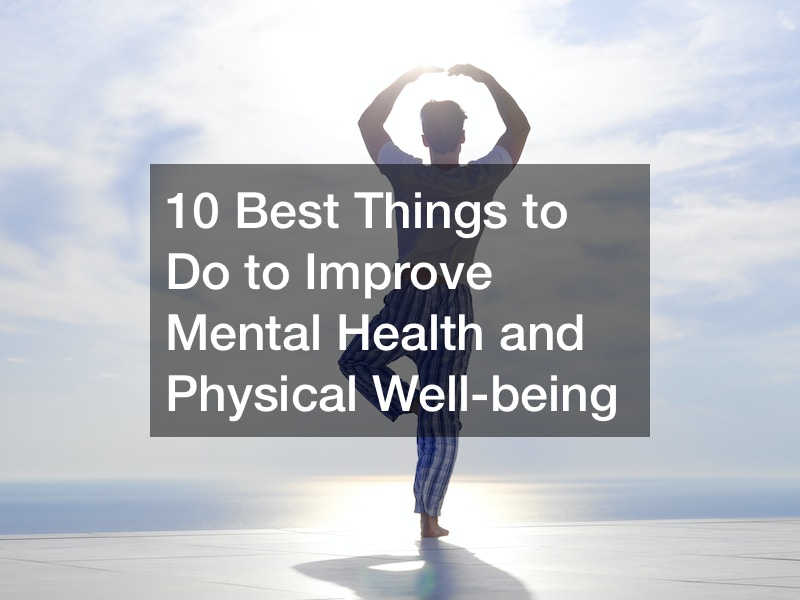

The popular saying ‘Health is Wealth’ implies that health is the most valuable asset anyone can have. If you are in good health, you can accomplish anything. Having money is not enough. You can only make good use of your wealth if you are in good health. The connection between physical and mental health may be stronger than you think.
Taking care of your physical well-being improves your mental health and vice versa. On the other hand, if one starts to decline, the other does as well. Physical health helps to alleviate the signs of depression, whereas mental illnesses can also lead to deterioration in physical health. Because of this inherent relationship, maintaining physical and mental health is critical. This article will guide you on the ten best things to do to improve mental health.
1. Improve Spinal Motion
The most outstanding network globally, the central nervous system, is housed in your spine. Simply put, your nervous system controls almost every process in the human body, making it a vital piece of equipment! That is why it is protected by strong bones, ligaments, and a shield of muscles. According to the Centers for Disease Control and Prevention (CDC), around 80% of adults will experience back pain at some point in their lives. Lower back ache accounts for more lost work hours than any other type of workplace injury.
The human spine receives a lot of sticks! But, in most instances, human habits are to blame for back problems, specifically when the needs of the spine are neglected. People do not always utilize their spines as nature intended. Poor posture, inactivity, and prolonged sitting are all bad for the spine! And the results are typically in the form of back problems. The goal of chiropractic treatment is to identify limitations within each type of spine movement and assist patients in regaining full mobility and well-being.
2. See to Maintaining Optimal Vision

Your eyes are vital to your senses because they allow you to interact with your environment and keep you mentally sharp and safe. As you grow older, protecting your sight can reduce your chances of becoming blind. This is one of the best things to do to improve mental health because it prevents having low vision while staying on top of any potential implications. The most common eye diseases include cataracts, diabetic retinopathy, and glaucoma. The sooner you detect and treat an eye condition, the better your chances of maintaining healthy vision.
Eye diseases can go undetected for a long time. In some cases, there are no symptoms at all. An eye doctor or optometrist must perform a comprehensive dilated examination to detect eye diseases in their early stages when intervention to prevent loss of vision is most effective. Visual acuity, eye alignment, depth perception, and eye movement are tested during diagnosis. Eye drops dilate your pupils, allowing your eye specialist to see inside your eyes and look for signs of medical issues.
3. Detoxify Your Body
The human body is constantly working to remove toxins and unwanted material from its various systems. The body depletes over time due to unhealthy food choices, drugs, alcohol, caffeine, stress, and toxic environmental elements common in modern life. Understanding the best things to do to improve mental health is vital. Regardless of how nutritious your diet or lifestyle is, some external factors still demand you allow your body to recharge. It is also essential to eliminate anything that may prevent it from experiencing better health and long-lasting resilience. When vital organs are put under too much stress and are unable to function appropriately, disease and illness can occur.
Making an effort to cleanse your body and nourish these vital organs helps prevent diseases. This has immediate benefits such as increased energy, better digestion, clearer skin, and mental clarity. Practices like toxin foot baths allow self-healing processes and self-cleansing to take over. Your body is naturally intelligent, and cleansing is the ideal way to reset the clock and embark on a path to a healthy, happy, more vibrant you!
4. Get Active

Exercise is about more than just aerobic fitness and muscle mass. Exercise can enhance your physical fitness and physique, help you lose weight, improve your sex life, and add years to your lifespan. However, that is not what motivates most individuals to stay active. People who exercise on a regular basis do so because it grants them a tremendous sense of wellness. They have more energy during the day, have sharper memories, sleep better at night, and are more relaxed and confident about their lives. It’s also an effective treatment for various common mental health issues.
Regular exercise has a positive impact on depression, ADHD, and anxiety. Exercise is among the best things to do to improve mental health. It also reduces stress, improves sleep, improves memory, and enhances your overall mood. You don’t need to be a fitness enthusiast to enjoy the benefits. Even small amounts of gymnastics programs can make a significant difference. You can use exercise as a helpful tool to cope with mental health issues, improve your outlook and energy and get more out of life, regardless of your age or fitness level.
5. Visit Spas
There’s no doubt that life can sometimes be challenging. From workplace deadlines to family responsibilities, it can be difficult to find time to unwind. However, it is critical to schedule time for self-care because stress can lead to various physical and mental health issues. Visiting a spa is an excellent way to relieve stress. Spas provide a variety of therapies to help soothe the body and mind. This is one of the best things to do to improve mental health because it provides much-needed relaxation from daily stressors. Spas are often considered a luxury, but having insurance for salons and spas can help you fund this program to achieve your desired mental health.
Spa exercises help you unwind and de-stress while also improving your mood. If you want to improve your mental health, consider visiting a spa. After just one visit, you’ll feel rejuvenated and refreshed. It will help to release any tension in the body and loosen tension in your mind. Consequently, you’ll feel relaxed and capable of dealing with everyday struggle.
6. Stretch Regularly

Regular stretching has numerous advantages. Stretching can help you increase flexibility, which is an essential part of physical fitness, and can also enhance your posture and relieve stress and body pain. Most people believe that stretching only applies when they go for a run, lift weights, play sports, or are injured. Even though these are the best things to do to improve mental health, stretching once a day, on the other hand, may benefit both mental and physical health. Daily stretching exercises have been proven to improve range of motion, blood flow to muscles, flexibility, as well as reduce stress.
When you don’t stretch, your muscles become tighter and shorter, reducing your range of movement and flexibility. It also increases your risk of injury. Depending on the severity of the injury, you may need knee joint replacements. Additionally, driving, sitting in your chair, or staring at a screen are all activities that can cause muscles to contract and cause pain. A quick Google search will yield numerous YouTube videos and websites for daily stretch routines using various techniques. When checking out these websites, keep in mind that dynamic and static stretching techniques should be prioritized over ballistic techniques.
7. Stay on Top of Insurance
Health coverage is a method of paying for health care and medical bills. Most people cannot afford to pay for healthcare expenses out of pocket or with a debit or credit card. Affordable health insurance can help you pay your medical bills and get the necessary care. A prolonged pandemic, economic uncertainty, and altered working conditions are increasing the global demand for mental health services. This occurs despite longstanding hurdles to accessibility and affordability.
Among the obstacles are high and rising treatment costs, limited service capacity, and widespread self and social stigma, which leads to long wait times. Like most physical ailments, mental illness is likely to worsen when left unattended. Consequently, this will increase healthcare costs, suffering, and productivity loss for insurers, individuals, and employers. Everyone needs to understand the best things to do to improve mental health. This is because, every year, mental illnesses cost the global economy a substantial amount of revenue.
8. Maintain Oral Health

In addition to keeping your smile attractive, regular dental visits can help your dentists detect possible ailments. It also reveals whether or not you risk developing chronic diseases. Your oral health reflects the overall health of your body. For example, a healthy mouth is an indication of good health. However, you may have other health issues if your oral health is poor.
Dental hygiene can prevent tooth decay, bad breath, and gum disease. It helps you maintain your teeth as you age. Good hygiene and dietary habits are among the best things to do to improve mental health. They are critical to achieving and sustaining mental and physical health throughout life. Oral health can impact your emotional and physical well-being by influencing your appearance, interpersonal relationships, nutrition, diet, and speech.
9. Purify Your Diet and Drink Intake
Clean water is essential for human survival. It is used for cooking, drinking, and other household purposes such as brushing, bathing, and washing clothes. It not only makes our lives healthier, but it is also necessary for maintaining sanitation around us. The tap water in our homes may appear clean, but it contains a variety of bacteria, viruses, and chemicals that are harmful to our health. They include pesticides, chlorine compounds, fluorine, mercury, lead, and waste particles.
Drinking contaminated water can cause serious health problems, and the consequences can be detrimental. Understanding the best things to do to improve mental health can go a long way in safeguarding everyone’s health. Water is a scarce resource chemically treated to combat various potentially dangerous viruses or bacteria. These bacteria cause illnesses each year hence the need for water purification systems.
10. Preserve Ear Health
When it comes to well-being, most people overlook the health condition of their ears. Your ears are not just part of your five senses. Your inner ear can have a major impact as well. Prioritizing the health of your ears with regular hearing tests and noise protection are critical components of ear wellness. Taking proper care of your ears can help you avoid hearing loss. Without paying proper attention, hearing loss frequently goes unnoticed, especially in children. Therefore, it is crucial to be aware of changes in hearing and to make an appointment with your primary care physician if you notice anything. Some types of hearing loss can be fixed by hearing aids, others can be cured and even reversed.
Nevertheless, these alternatives may be out of reach without an early assessment and an open dialogue. Loud noises from activities such as shooting firearms and concerts can cause injury to your ears, especially if you don’t protect them properly. Your place of work can be loud and noisy, which is why companies are usually required to implement noise conservation measures for noise levels that exceed a certain threshold.
There is a common myth that you should not be concerned about your mental well-being if you do not suffer from a mental health illness. It’s important to keep in mind that being well does not imply the absence of stress or illness. Wellness is the conscious process of living a fulfilling and healthy life. Just as you can grow habits to achieve better physical health, you can also learn the best things to do to improve mental health. Mental and physical well-being are inextricably linked in many aspects and should be seen as skills that must be developed and practiced in a balanced manner.





